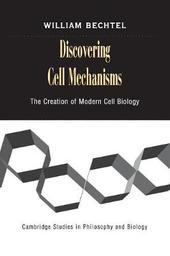
|
Discovering Cell Mechanisms: The Creation of Modern Cell Biology
Paperback / softback
Main Details
| Title |
Discovering Cell Mechanisms: The Creation of Modern Cell Biology
|
| Authors and Contributors |
By (author) William Bechtel
|
| Series | Cambridge Studies in Philosophy and Biology |
|---|
| Physical Properties |
| Format:Paperback / softback | | Pages:336 | | Dimensions(mm): Height 227,Width 151 |
|
| Category/Genre | Philosophy of science
Cellular biology (cytology) |
|---|
| ISBN/Barcode |
9780521729444
|
| Classifications | Dewey:571.6 |
|---|
| Audience | | Professional & Vocational | |
|---|
| Illustrations |
Worked examples or Exercises
|
|
Publishing Details |
| Publisher |
Cambridge University Press
|
| Imprint |
Cambridge University Press
|
| Publication Date |
28 April 2008 |
| Publication Country |
United Kingdom
|
Description
Between 1940 and 1970 pioneers in the new field of cell biology discovered the operative parts of cells and their contributions to cell life. They offered mechanistic accounts that explained cellular phenomena by identifying the relevant parts of cells, the biochemical operations they performed, and the way in which these parts and operations were organised to accomplish important functions. Cell biology was a revolutionary science but in this book it also provides fuel for yet another revolution, one that focuses on the very conception of science itself. Laws have traditionally been regarded as the primary vehicle of explanation, but in the emerging philosophy of science it is mechanisms that do the explanatory work. Bechtel emphasises how mechanisms were discovered, focusing especially on the way in which new instruments made these inquiries possible. He also describes how new journals and societies provided institutional structure to this new enterprise.
Author Biography
William Bechtel is professor of philosophy and science studies at the University of California, San Diego. He is the author and editor of many books, including Discovering Complexity (with Robert C. Richardson, 1993) and Connectionism and the Mind (with Adele Abrahamsen, 2002), and he is editor of the journal Philosophical Psychology. He is the current chair of the Cognitive Science Society and past president of the Society for Philosophy and Psychology and the Southern Society for Philosophy and Psychology.
ReviewsThis volume...will be useful not only to cell biologists interested in the embryology of their field, but also to theorists and historians of science concerned with the boundaries of fields of intellectual inquiry. -Choice "For decades historians have been preoccupied with genetics and molecular biology. However, mitochondria, ribosomes, Golgi bodies, and lysosomes explain the life processes of the cell; DNA does so only peripherally. This is their much needed story." -Douglas Allchin, Isis "Historians will appreciate Bechtel's thorough research in the archives of the Rochefeller Foundation and the American Society for Cell Biology, as well as his use of oral history interviews with some of the principal scientists...Cell biologists especially welcome this new history of their field." -Lindley Darden, University of Maryland, Journal of the History of Biology
|